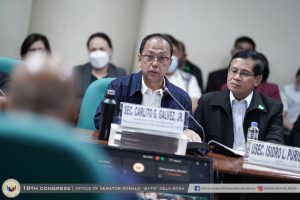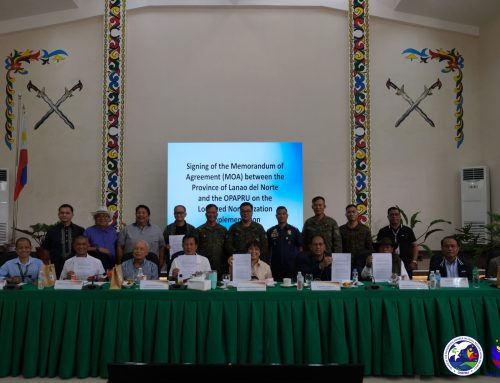PASAY CITY – The Senate Committee on Finance (Subcommittee “C”) chaired by Senator Ronald ‘Bato’ Dela Rosa approved during its budget hearing on Wednesday, September 20, the proposed Php 7 billion budget of the Office of the Presidential Adviser on Peace, Reconciliation and Unity (OPAPRU) and the National Amnesty Commission (NAC).
Presidential Peace Adviser Secretary Carlito G. Galvez Jr., presented the agency’s budget proposal along with OPAPRU Senior Undersecretary Isidro Purisima and Presidential Assistants Wilben Mayor and Arnulfo Pajarillo.
Galvez noted that it is high time for the government to invest more resources in peacebuilding, as the country is now heading towards the era of post-conflict reconstruction, rehabilitation and transition.
“At the onset, let me point out that the rationale for the OPAPRU budget increase has been our repeated call to fund socio-economic interventions, particularly as we focus now on the post-conflict reconstruction, rehabilitation and transition to sustainable peace and development,” Glavez said during his presentation.
He stressed that the government must devote its resources to addressing the socio-economic triggers that lead to recruitment and rebellion, preventing renewed rebellion, and encouraging members of rebel groups to come forward and return to the folds of the law.
“We will fund [for 2024] the Php 5 billion PAyapa at MAsaganang PamayaNAn (PAMANA) projects that have been restored to OPAPRU to deliver on the socio- economic interventions to ensure changed lives and transformed communities,” Galvez said.
The PAMANA Program is a priority program of the national government that supports the peace negotiation track and contributes to the goal of attaining a just and lasting peace for all Filipinos and the country.
Among the PAMANA projects that are being implemented by the OPAPRU in partnership with national line agencies and local government units include agriculture productivity support, bridges, roads, and water systems and other community-level infrastructure.
These projects are primarily implemented in conflict-affected and conflict-vulnerable areas and remote, hard-to-reach communities that have been lagging behind in terms of economic development.
Over the past several years, the OPAPRU has been operating with an average budget of only Php 800 million, the bulk of which are fund transfers made to partner-agencies such as Department of Social Welfare and Development (DSWD), Armed Forces of the Philippines (AFP), Philippine National Police (PNP), Philippine Statistics Authority (PSA), Department of Agriculture (DA) and to recipient local government units (LGUs) to implement its deliverables such as the decommissioning of Moro Islamic Liberation Front (MILF) combatants, confidence-building measures and limited social protection projects.
“The fund transfers make up close to 60 percent of our budget to support the components and post-conflict reconstruction of communities that are at the heart of conflict-affected areas,” Galvez said.
Aside from the Php 7 billion proposed budget, Galvez also requested for an additional 800 million budget allocation for the agency’s unfunded priority requirements, such as the budget for the NAC, and the remaining transitional cash assistance to complete the decommissioning of 40,000 MILF combatants, as well as peace education programs.
“We are severely affected by previous budget cuts brought about by the pandemic, particularly for the deficit support to operations. This is a total of more than Php 800 million request for unfunded requirements to allow us to deliver on commitments [made] by the government under signed peace agreements,” Galvez said.
Among the initiatives under OPAPRU’s unfunded priority programs is the operationalization of the National Amnesty Commission (NAC) which President Ferdinand Marcos Jr., is actively pushing for.
The NAC was established on February 5, 2021 by virtue of Executive Order No. 125. It is primarily tasked to receive and process applications for amnesty that were filed through the Local Amnesty Board (LAB). Its operations are currently being funded by the OPAPRU.
During the budget hearing, NAC chairperson Leah Tanodra-Armamento stressed the commission’s need to establish fiscal autonomy since its operating expenses are being shouldered by the OPAPRU.
However, according to EO 125, in terms of funding, the funds of the NAC shall only come from OPAPRU.
“If your desire is to separate totally from the OPAPRU, siguro, by creating an executive order maybe through you [Sec. Galvez], we can amend so they can be totally independent. Congress cannot interfere with [the] executive order since it is an executive order, not a legislative action,” Dela Rosa explained.
He also pledged to help the NAC in the process of establishing its fiscal autonomy so it can effectively carry out its crucial mandate.
“This budget will fund our projects and these projects will uplift the lives of millions of people in conflict affected areas. This budget is a peace investment because once all the signed peace agreements are fulfilled under the Marcos administration, we could all enjoy a more peaceful and more developed Bagong Pilipinas,” Galvez said. ###
















